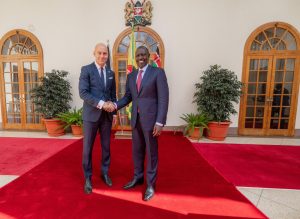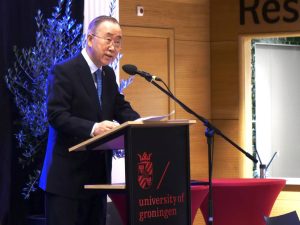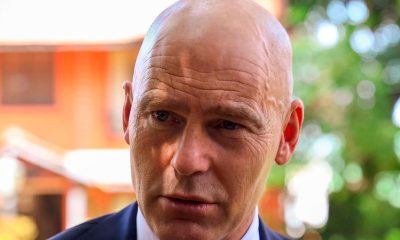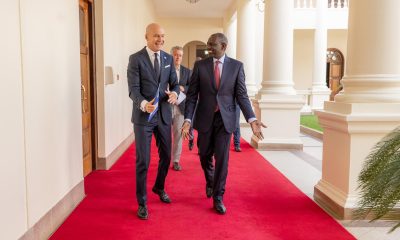Investigations
Dutch Firm Linked to UON Chancellor Exposed in A Fresh Hostile Working Environment Report
Multiple former employees describe a consistent pattern of abuse orchestrated by Verkooijen and senior management.
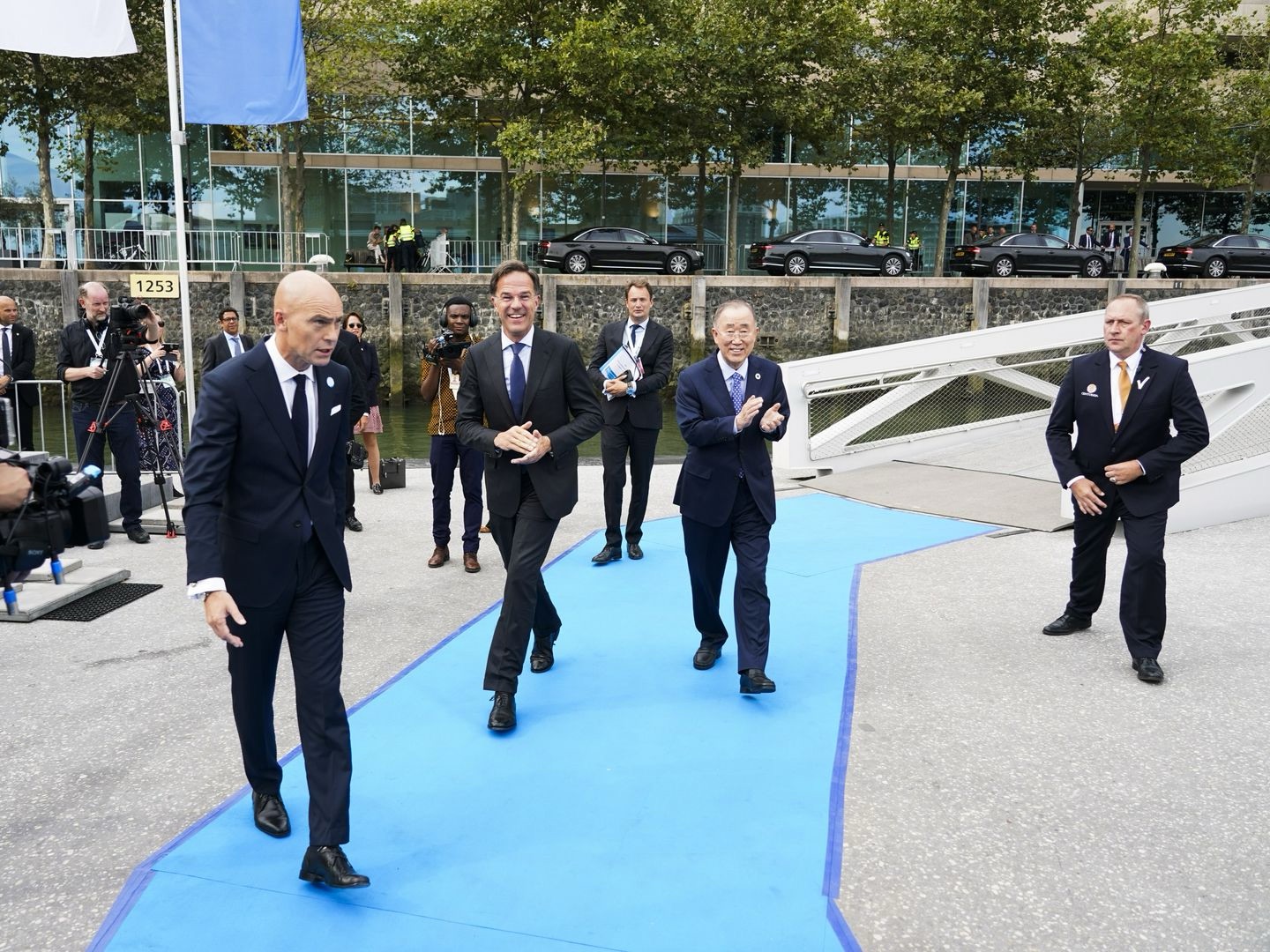
Bombshell Investigation Reveals Years of Psychological Warfare, Public Humiliation, and Mass Staff Exodus at Climate Organization Now Operating in Kenya with Full Diplomatic Immunity
NAIROBI, Kenya – November 6, 2025 – Just as Kenyans continue demanding answers about why a scandal-plagued Dutch organization was granted unprecedented diplomatic immunity by President William Ruto’s government, a devastating new exposé has emerged revealing the Global Center on Adaptation operated a culture of systematic psychological abuse that left employees burned out, humiliated, and mentally destroyed.
The explosive investigation by Dutch public broadcaster NOS, based on conversations with more than twenty former employees and extensive documentation, paints a nightmarish picture of daily life inside the Rotterdam headquarters of the climate organization now establishing its African base in Nairobi under the leadership of University of Nairobi Chancellor Patrick Verkooijen.
The timing couldn’t be more damning.
While Kenyans are still reeling from revelations that GCA systematically lied to international donors about its achievements and falsely claimed credit for hundreds of millions of dollars in projects it never worked on, this fresh investigation exposes something even more sinister happening behind closed doors: a reign of terror that former employees describe as being run by “roosters,” “alpha males,” and “pure bokitos.”
For those unfamiliar with the term, bokito is a reference to a particularly aggressive gorilla that escaped from Rotterdam Zoo in 2007, attacking a woman who had been making eye contact with it.
Former GCA employees chose the term deliberately to describe the primal, chest-beating dominance culture that defined their workplace under Verkooijen’s leadership.
A Revolving Door of Broken People
The staff turnover at GCA tells its own story.
When Professor Shuaib Lwasa, now teaching at Erasmus University, looks at the organization’s current website, he sees almost no one who worked there during his tenure.
The entire workforce has been replaced, multiple times over, as employees fled what they describe as a toxic environment that prioritized intimidation over impact.
“Working at GCA ended up in a burnout,” says former employee Sander Chan, now a researcher at Radboud University. Chan is careful to clarify that he has worked under high pressure at other organizations without issue. The problem at GCA wasn’t the workload, it was the method of pressure application. “The way you were put under pressure at GCA was way too much,” he told investigators.
Chan and Lwasa were the only former employees willing to speak on the record. The rest, more than twenty people who provided detailed testimony to NOS investigators, demanded anonymity. Why? Because they fear Patrick Verkooijen and his inner circle will destroy their careers if they speak publicly about what they witnessed and experienced inside GCA.
Think about that for a moment.
These are educated professionals, many with advanced degrees and impressive résumés, working in the international development and climate sectors, and they are terrified to speak openly about their former employer because they believe he has the power and willingness to ruin their professional futures.
This is the man President Ruto appointed to lead Kenya’s flagship university.
This is the man now operating in Nairobi with diplomatic immunity that shields him from lawsuits, prosecution, and accountability.
The Pattern: Impossible Tasks, Inevitable Failure, Public Destruction
Multiple former employees describe a consistent pattern of abuse orchestrated by Verkooijen and senior management.
The cycle worked like this: subordinates would be assigned tasks that were deliberately unfeasible, structured in ways that guaranteed failure regardless of how hard the employee worked or how competent they were.
When the inevitable failure materialized, the employee would be “hard settled” on it, to use the phrasing of one former high-ranking GCA official.
These settlements weren’t private coaching sessions or constructive feedback delivered behind closed doors. They were public spectacles designed to humiliate and break the targeted employee.
“If their work didn’t satisfy the director or his closest advisors, colleagues were ‘finished,’” multiple sources told investigators.
Their professional competence would be constantly questioned in front of peers.
They would be humiliated in meetings, intimidated into silence, and gradually isolated within the organization until they either quit or were pushed out.
“It gills you mentally,” one former employee said, using Dutch slang that roughly translates to being psychologically eviscerated. “It costs you all your confidence.”
Former staff members describe an atmosphere of pervasive fear when Verkooijen was present in the Rotterdam floating office.
“When Patrick was present, there was tension in the building,” one recent employee told NOS. “He often shouted in meetings and that could be heard in the corridors.”
Another described their time at GCA in stark terms: “It was the most terrible professional experience I’ve ever had.”
The Ban Ki-moon Weapon
Perhaps most disturbing is how Verkooijen allegedly weaponized his relationship with former United Nations Secretary-General Ban Ki-moon, who serves as GCA’s board chairman and has called Verkooijen “the most exceptional person I’ve ever met.”
According to multiple sources, Verkooijen routinely used Ban’s name “as a sword and shield” to intimidate subordinates and pressure other organizations into compliance. The implicit message was clear: you’re not just disagreeing with me, you’re disagreeing with a former UN chief who has my complete backing.
NOS investigators obtained WhatsApp messages that illustrate this dynamic.
In one exchange, after an argument with a subordinate, Verkooijen makes it clear that the employee now stands alone while he has Ban Ki-moon on his side. He then terminates the conversation unilaterally with a curt message: “And this conversation between us is now over.”
The employee who received those messages has now provided a statement, distributed by GCA, claiming the WhatsApp traffic was “unlawfully shared” and presents an “incorrect and misleading image.”
He insists the disagreement was fully resolved with mutual apologies, and that he subsequently joined GCA in a senior management position because he has “full confidence in the leadership of Mr. Verkooijen.”
Read that carefully.
This is a person who was on the receiving end of Verkooijen’s intimidation tactics, who later returned to work in senior management, now defending the very behavior he experienced.
Former employees told investigators this is precisely how the system works: people who submit, who demonstrate their willingness to accept the abuse and align with the power structure, are rewarded with positions of authority.
Those who resist are destroyed.
The Survey That Said the Quiet Part Out Loud
In 2022, GCA conducted an internal employee survey.
The results, obtained and shared with NOS by a former staff member, are damning in their clarity.
More than half of the employees described the management style as autocratic.
Decisions were made without involving staff. Contradiction was undesirable, meaning employees who questioned leadership faced consequences.
When confronted with these findings, GCA’s response was revealing. The organization characterized the autocratic culture that existed “more than four years after its founding” as “a typification that fit the starting phase in which direction and structure were essential.”
Translation: yes, we ran the place like a dictatorship, but that was necessary during our startup phase. Don’t worry, we’ve evolved now into “a coaching and inclusive working method.”
But former employees who worked at GCA more recently contradict this narrative entirely.
The toxic culture didn’t end years ago.
It continued right up until employees fled and donors started pulling funding.
The shouting in meetings, the public humiliation, the impossible demands, the isolation of those who disagreed with Verkooijen—all of it continued while GCA was simultaneously telling the world it had reformed.
The Total Isolation Treatment
One of the most chilling descriptions came from a former GCA employee who witnessed what happened to colleagues who fell out of favor with Verkooijen over substantive disagreements on issues he considered important.
“You’re just done at the center. You are no longer interesting,” the source explained. “He’s destroying your life in the center. No one is allowed to talk to you, you are no longer allowed to go to events or meetings.”
This is workplace abuse that goes beyond shouting or harsh criticism.
This is systematic social isolation designed to make someone’s professional existence so miserable they have no choice but to leave.
And it worked. The staff turnover at GCA has been so complete that almost no one who worked there in the early years remains today.
Verkooijen’s Non-Apology
In response to the investigation, Verkooijen issued what can only be described as a classic non-apology that manages to acknowledge the accusations while simultaneously justifying the behavior and reframing it as the unfortunate side effect of passionate commitment.
He admits that the descriptions from former employees “touch” him. He acknowledges asking a lot “of myself and my environment.” He describes his position as “not a job, but a vocation,” the kind of language that implicitly suggests ordinary standards of workplace conduct don’t apply to someone on a mission as important as his.
“We work with urgency, under great pressure and sometimes have strong discussions,” Verkooijen wrote. “However, this should never be at the expense of a safe and respectful working environment.”
Notice the construction here.
First, he frames the abusive behavior as merely “strong discussions” born of urgency and pressure. Then he adds the caveat that it “should never” come at the expense of safety and respect, as if this is a theoretical principle rather than a description of what actually happened to dozens of employees under his leadership.
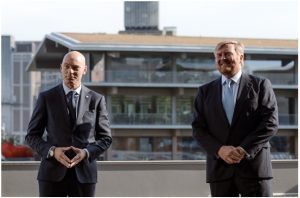
The Centre for Global Adaptation CEO Patrick Verkoojien with the King of Netherlands Willem Alexander at the inauguration of Prof Dr Patrick Verkoojien’s Centre for Global Adaptation floating office at Rotterdam in 2021.
He continues: “I know my tone can be sharp sometimes. This stems from my strong commitment and result-driven way of working. I am passionate about our mission and believe that ambition and speed are needed to make a difference. At the same time, I realize that that sharp tone can be experienced by some as fierce or too direct.”
This is textbook abuser language.
My behavior isn’t the problem, your perception of my behavior is the problem.
I’m not abusive, I’m passionate. I’m not creating a hostile work environment, I’m committed to results. Some people, the weak ones presumably, might “experience” my leadership as “fierce or too direct,” but that’s really more about their sensitivity than my conduct.
There’s no acknowledgment that screaming at people in meetings, assigning impossible tasks designed to set them up for failure, publicly humiliating subordinates, isolating employees who disagree, and using powerful connections to intimidate staff might constitute actual workplace abuse rather than just a “sharp tone” that some delicate souls misinterpret.
The Ministry That Knew and Did Nothing
Perhaps the most infuriating aspect of this entire scandal is that the Dutch government knew exactly what was happening inside GCA and chose to do nothing about it for years.
The Ministry of Infrastructure and Water Management founded the GCA foundation in 2017. Several ministry officials subsequently worked at the center or maintained close contact with it.
The poor working atmosphere, the toxic culture, the mass staff exodus—all of it was visible to Dutch government officials who had oversight responsibility for an organization they had created and were funding with taxpayer money.
Yet no one intervened.
Not when the first employees burned out and quit.
Not when the staff turnover became a revolving door.
Not when the internal surveys revealed that more than half the workforce described the management as autocratic.
Not when former employees started quietly warning others in the international development community about the culture inside GCA.
The ministries finally acknowledged receiving “a limited number of signals” through informal contacts about “the dominant role of the CEO within the organization.” But these signals “were not such that action was taken towards GCA.”
What exactly would have constituted signals serious enough to warrant action? How many burned-out employees needed to flee? How many people needed to describe the workplace as being run by “bokitos” before Dutch officials decided that perhaps an organization they created and funded should be held to basic standards of workplace conduct?
For Sander Chan, the government’s inaction remains incomprehensible. “Even though it’s not entirely public, there is talk and people who work in this field know what’s going on with GCA,” he told investigators.
The reputation was known within the international development community. The Dutch government simply chose to look the other way.
From Toxic Workplace to Kenyan Sanctuary
And now this organization, with its documented history of workplace abuse, donor deception, and falsified impact claims, has been granted sweeping diplomatic immunity by the Kenyan government and is establishing its African headquarters in Nairobi.
The parallels to our previous reporting are impossible to ignore.
Just as GCA claimed credit for projects it never worked on, inflating its impact to secure donor funding, the organization also created an internal culture where staff were pressured to fabricate results and embellish achievements.
The external fraud and the internal abuse weren’t separate problems, they were two sides of the same toxic coin.
Employees who tried to maintain professional integrity, who questioned whether GCA should claim credit for other organizations’ work, who pushed back against the exaggeration and fabrication, found themselves targets of Verkooijen’s wrath.
They were the ones assigned impossible tasks, publicly humiliated when they inevitably fell short, and systematically isolated until they quit.
Those who survived and advanced within the organization were the ones who accepted the fraudulent practices, who participated in the inflation of results, who kept their heads down and went along with a culture that prioritized securing funding over honest reporting.
And this is the organization that President Ruto has embedded so deeply in Kenya’s governance structure that the Ministry of Environment will literally operate from inside GCA’s Nairobi headquarters.
This is the man Ruto appointed to lead the University of Nairobi, giving him authority over the education of Kenya’s future leaders.
The Questions That Demand Answers
The Dutch investigation raises urgent questions that go directly to the heart of the GCA-Kenya arrangement:
Why did President Ruto appoint as University of Nairobi Chancellor a man whose organization has such a well-documented pattern of workplace abuse that former employees are afraid to speak publicly about their experiences?
Why grant diplomatic immunity to an organization whose CEO uses intimidation, public humiliation, and systematic isolation as management tools?
What due diligence did the Kenyan government perform before handing sweeping privileges to GCA? Did anyone speak with former employees? Did anyone investigate the staff turnover rate? Did anyone question why an organization founded in 2017 has almost completely replaced its workforce multiple times over?
How can Kenyan workers possibly be protected from the same abusive culture that destroyed the mental health and professional confidence of their Dutch counterparts when GCA now operates with immunity from lawsuits and prosecution?
What happens when Kenyan staff at GCA’s Nairobi headquarters experience the same pattern of impossible tasks, inevitable failure, and public humiliation? Who will they report to? Who will hold Verkooijen accountable when he has diplomatic immunity and serves as Chancellor of the country’s premier university?
What message does it send to young Kenyans, particularly women entering the workforce, when their government grants protected status to an organization described by former employees as being run by “alpha males” and “roosters” where contradiction is undesirable and disagreement leads to professional destruction?
The Ruto Connection Makes This Even Worse
Remember that President Ruto didn’t just grant GCA immunity and allow it to establish headquarters in Nairobi.
He personally appointed Verkooijen to one of the most prestigious positions in Kenyan academia while GCA was simultaneously funneling over a million euros to that same university.
Ruto joined GCA’s advisory board in September 2023. Just months later, in January 2024, he appointed Verkooijen as University of Nairobi Chancellor.
GCA had already been channeling funds to the university before the appointment and continued afterward, despite obvious conflict of interest concerns.
When Dutch investigators questioned this arrangement, GCA dismissed concerns, claiming the funding was “pre-arranged” and complied with “their rules”—meaning the organization’s own internal policies, the very governance framework that Dutch, British, Norwegian, and Danish donors all found so inadequate they withdrew or froze funding.
Now we know that those internal GCA rules also permitted a workplace culture where employees were systematically abused, where staff surveys revealed autocratic management, where former employees describe being “finished” and having their lives “destroyed” within the organization if they dared disagree with leadership.
These are the “rules” that Verkooijen claims justify his organization’s operations in Kenya.
These are the internal standards that Ruto’s government accepted without question when granting unprecedented immunity.
The Dutch Abandonment
While Kenya welcomes GCA with open arms and unprecedented privileges, the organization’s home country is walking away in disgust.
The Dutch government has announced it will cease funding GCA after 2026. The United Kingdom has already pulled all support. The Gates Foundation, once a major donor, is reconsidering its involvement.
The NOS workplace investigation is just the latest in a series of damning exposés that have cost GCA its European support base.
Previous investigations revealed the systematic lying to donors, the false claims about World Bank projects, the grossly exaggerated impact figures, the pressure on staff to fabricate results.
Now comes confirmation that the same culture of deception extended internally, creating a workplace so toxic that employees literally suffered burnout and mental health crises, where professional confidence was systematically destroyed, where speaking up meant professional annihilation.
And GCA’s response to losing European funding? Flee to Africa. Specifically to Kenya, where a president facing his own accusations of human rights abuses and violent crackdowns on protesters has proven willing to grant sanctuary, immunity, and institutional capture in exchange for… what exactly?
The €3 million that GCA claims it will invest in Kenya, money that will likely be leveraged into claims of “mobilizing” billions in climate finance using the same exaggerated accounting that got the organization defunded in Europe?
What Happens Next Should Terrify Every Kenyan Worker
GCA is now recruiting Kenyan staff for its Nairobi headquarters. Young, idealistic professionals passionate about climate change will apply for these positions, attracted by the organization’s mission and the prestige of working for an international climate center.
They will have no idea what they’re walking into.
The Dutch investigations aren’t widely reported in Kenya.
The exposés about donor fraud and workplace abuse haven’t penetrated Kenyan media coverage, which has focused primarily on the immunity controversy.
These young Kenyans will show up for work at GCA’s new offices, probably excited and grateful for the opportunity, completely unaware that they’re entering an organization with a documented pattern of assigning impossible tasks, publicly humiliating employees who fail, isolating those who disagree, and pressuring staff to exaggerate results and claim credit for other people’s work.
And when they experience the same abuse that drove dozens of European employees to quit, when they find themselves on the receiving end of Verkooijen’s “sharp tone” and “fierce” management style, when they’re assigned tasks designed to fail and then “finished” for failing, when they’re told that Ban Ki-moon supports the boss and they stand alone, what recourse will they have?
They can’t sue GCA. The organization has immunity. They can’t go to the labor ministry.
GCA operates outside Kenya’s employment regulations.
They can’t speak publicly without risking their careers, because Verkooijen has shown a consistent willingness to use his powerful connections to intimidate and silence critics.
They can’t even expect solidarity from their colleagues, because GCA’s culture actively punishes employees who show support for targeted individuals.
They will be trapped in exactly the same nightmare that burned out and broke down their European predecessors, except they won’t even have the legal protections and institutional support systems that exist in the Netherlands.
They’ll be completely on their own, working for an organization that has been granted untouchable status by their own government.
Parliament’s Betrayal
Kenya’s Parliament rubber-stamped GCA’s immunity request with virtually no scrutiny.
The National Assembly Committee on Environment, Forestry and Mining produced a report that makes no mention of donor fraud allegations, workplace abuse patterns, or governance concerns that led multiple European governments to withdraw funding.
The committee simply noted that GCA had worked with Kenya since 2021 and would invest €3 million in food security and infrastructure.
They catalogued the sweeping immunities being granted, immunity from lawsuits, protection from government audits, tax exemptions, freedom from prosecution, but never asked the most basic question: why does a climate NGO need diplomatic immunity typically reserved for sovereign states?
They never asked why GCA was fleeing Europe.
They never investigated why the organization’s entire workforce had turned over multiple times.
They never questioned the conflict of interest in appointing the organization’s CEO as University of Nairobi Chancellor while that organization funnels money to the university.
They never demanded to see the internal employee surveys or speak with former staff.
They just approved it.
Waved it through. Granted a scandal-plagued foreign organization immunity from Kenyan law and accountability to Kenyan citizens, all based on promises of investment from an organization that European donors have determined cannot be trusted to honestly report its results.
The Sovereign Surrender
This is what betrayal of the public interest looks like.
A government that grants an organization immunity from its own laws surrenders sovereignty.
When that organization has a documented history of deception and workplace abuse, the surrender becomes complicity.
President Ruto and his administration have taken a foreign entity that lost the confidence of its home country and multiple major international donors, an organization whose CEO creates work environments so toxic that employees suffer mental health crises, and given it protected status in Kenya while embedding it directly in the country’s environmental governance structure and academic leadership.
They’ve done this with minimal transparency, no meaningful public consultation, cursory parliamentary oversight, and dismissive responses to legitimate questions from citizens and civil society about why these extraordinary privileges are necessary.
And when Kenyans dared to ask questions, when social media erupted with the hashtag #WhyGCAImmunity, when opposition leaders demanded the full Host Country Agreement be published, when activists pointed out the obvious conflicts of interest and governance red flags, the response was to characterize the concerns as conspiracy theories and misinformation.
But there’s nothing theoretical about burned-out employees.
There’s nothing conspiratorial about staff surveys showing autocratic management. There’s nothing misinformed about former employees describing their workplace as being run by “bokitos” where people were “finished” and had their lives “destroyed” for disagreeing with leadership.
These are facts, documented by credible journalists who interviewed dozens of sources and examined hundreds of internal documents.
These are the realities of what happened inside GCA’s European headquarters, realities that Kenyan workers will now experience firsthand in Nairobi unless something changes.
The Reckoning That Must Come
The Dutch investigations have done Kenyans an extraordinary service by exposing exactly who we’re dealing with.
Not just an organization that lies to donors and claims credit for others’ work, but a workplace culture that systematically destroys the mental health and professional confidence of employees who refuse to participate in the fraud.
The two are inseparable.
An organization built on deception requires a culture of intimidation to function.
Employees with integrity who question the false claims must be silenced, broken, and expelled. Those who remain must be the ones willing to go along with the fabrication, who will embellish results when pressured, who will keep their heads down even as they watch colleagues destroyed.
This is what Kenya has granted sanctuary to.
This is what President Ruto has embedded in our university system and environmental governance. This is what our Parliament approved without scrutiny.
The immunity must be revoked.
The Host Country Agreement must be published in full. The Ministry of Environment must not operate from inside GCA’s headquarters.
The conflict of interest between Verkooijen’s roles as GCA CEO and University of Nairobi Chancellor must be resolved.
And Kenyan workers who take positions at GCA in good faith, believing they’re joining an organization fighting climate change, deserve protection from the toxic culture that broke their European counterparts.
They deserve to know what they’re walking into.
They deserve legal recourse if they experience abuse. They deserve accountability mechanisms that actually function.
None of that is possible under the current arrangement. GCA operates with immunity from Kenyan law.
Verkooijen holds power over Kenya’s premier university while running an organization with documented patterns of workplace abuse.
The environmental regulator will operate as tenant of the regulated entity.
Kenyan workers will have fewer protections than their Dutch predecessors, who at least could speak to labor inspectors and journalists without fear of diplomatic immunity being weaponized against them.
This is not climate action. This is not adaptation.
This is not partnership.
This is surrender of sovereignty and betrayal of the public interest dressed up in the language of international cooperation and climate emergency.
Kenyans deserve better.
Our workers deserve better. Our students deserve better. Our sovereignty deserves better.
The Dutch have figured out what the Global Center on Adaptation really is. They’ve documented it meticulously. They’ve published the evidence. They’ve walked away.
Kenya should do the same before it’s too late, before more young Kenyans get chewed up by an abusive organizational culture that our own government granted immunity, before more public resources flow to an entity that European donors determined cannot be trusted, before the environmental governance structure becomes so captured that genuine climate action becomes impossible.
The question is whether President Ruto and Parliament have the courage to admit they made a catastrophic mistake, or whether they’ll continue defending the indefensible until the damage becomes irreversible.
The Dutch exposed the truth. Now Kenyans must act on it.
Kenya Insights allows guest blogging, if you want to be published on Kenya’s most authoritative and accurate blog, have an expose, news TIPS, story angles, human interest stories, drop us an email on [email protected] or via Telegram
-

 Grapevine2 weeks ago
Grapevine2 weeks agoAlleged Male Lover Claims His Life Is in Danger, Leaks Screenshots and Private Videos Linking SportPesa CEO Ronald Karauri
-

 Grapevine1 week ago
Grapevine1 week agoRussian Man’s Secret Sex Recordings Ignite Fury as Questions Mount Over Consent and Easy Pick-Ups in Nairobi
-

 Investigations6 days ago
Investigations6 days agoMulti-Million Dollar Fraud: Three Kenyans Face US Extradition in Massive Cybercrime Conspiracy
-

 News4 days ago
News4 days agoTHE FIRM IN THE DOCK: How Kaplan and Stratton Became the Most Scrutinised Law Firm in Kenya
-

 Economy5 days ago
Economy5 days agoIran Demands Arrest, Prosecution Of Kenya’s Cup of Joe Director Director Over Sh2.6 Billion Tea Fraud
-

 Business5 days ago
Business5 days agoA Farm in Kenya’s Rift Valley Ignites a National Reckoning With Israeli Investment
-

 Business2 weeks ago
Business2 weeks agoM-Gas Pursues Carbon Credit Billions as Koko Networks Wreckage Exposes Market’s Dark Underbelly
-

 Africa1 week ago
Africa1 week agoFBI Investigates Congresswoman Ilhan Omar’s Husband’s Sh3.8 Billion Businesses in Kenya, Somalia and Dubai

